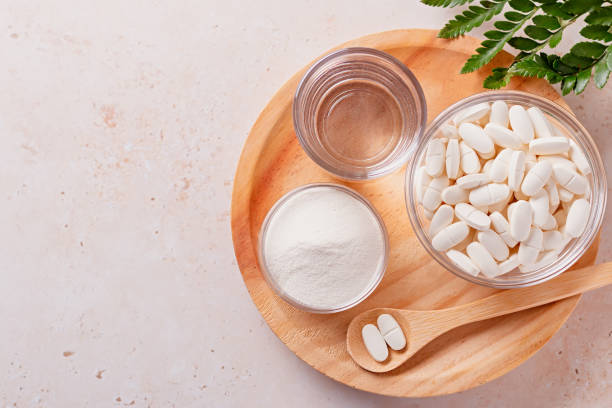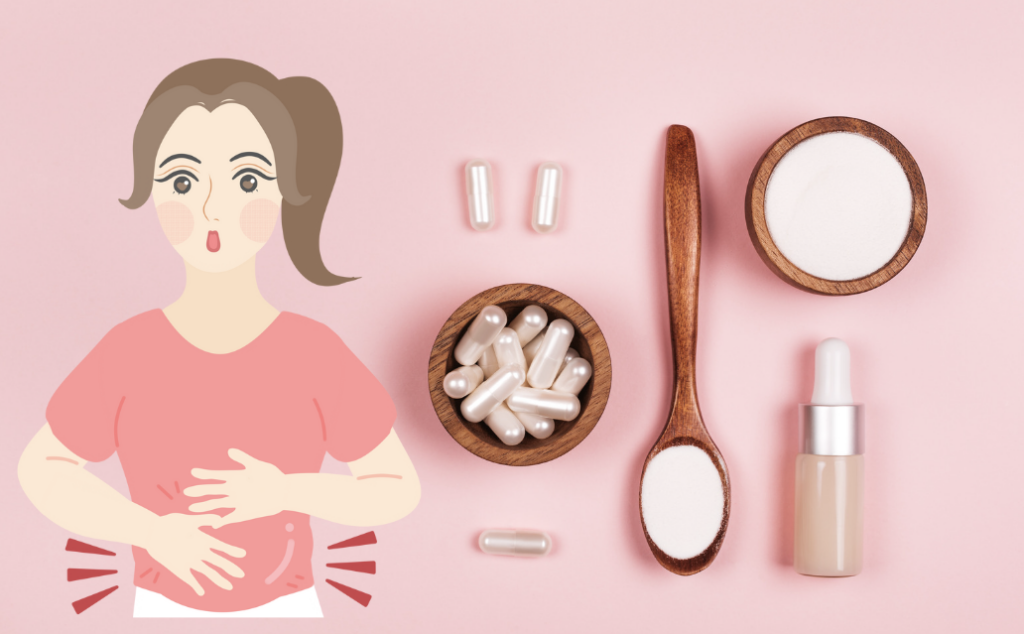Supplements and Herbs
Why Do Collagen Supplements Cause Bloating
Do you feel bloated after taking collagen supplements? If so, you are not alone. Many individuals worry if the bloating caused by collagen will eventually go away. In this article, we will look into the matter and present you with some useful information.
What is Bloating?
Bloating is a frequent digestive problem marked by a sense of fullness or tightness in the belly. It may be accompanied by excessive gas, discomfort, or even pain. This illness is commonly caused by a buildup of gas or fluid in the gastrointestinal tract.
Understanding Collagen and Its Effects on Digestion
Collagen is a protein that is essential for the body’s structure and support of numerous tissues such as the skin, bones, and joints. It is naturally made by the body, although it can also be gained by diet or supplementation.
When collagen is ingested as a supplement, it is digested into amino acids. These amino acids, including glycine and glutamine, are required for many biological activities. However, taking high amounts of collagen might raise the concentration of these amino acids in the digestive tract, thereby causing bloating.

Common Causes of Bloating from Collagen
There are several reasons why collagen can induce bloating in some people. To begin, collagen supplements are frequently derived from animal sources, such as cattle or fish. Some people may have trouble digesting these animal proteins, resulting in bloating and other digestive difficulties.
Second, collagen supplements are often hydrolyzed, which means they are broken down into tiny peptides for easier absorption. While this process improves bioavailability, it can also cause the release of gasses during digestion, resulting in bloating.
Finally, taking collagen with certain foods or beverages may increase bloating. For example, mixing collagen powder with fizzy drinks or eating it with high-fiber foods will boost gas production and cause bloating.
How Long Does Bloating from Collagen Last?
The length of collagen-induced bloating varies by individual. In most cases, the bloating is just brief and will pass within a few hours or days. The digestive system usually adjusts to the increased amino acid content, and the bloating subsides on its own.
However, if you are having persistent or severe bloating, you should see a doctor. Persistent bloating may indicate an underlying digestive issue or an unpleasant reaction to the collagen supplement.

Tips to Reduce Bloating from Collagen
If you’re suffering bloating from collagen, there are various ways you can attempt to alleviate the discomfort:
- Start with a low dose: Begin with a low dose of collagen and progressively increase it over time. This allows your body to adjust to the supplement more easily, potentially reducing bloating.
- Stay hydrated: Drinking plenty of water will help digestion and prevent constipation, which can lead to bloating. Drink plenty of water throughout the day, particularly if you’re using collagen supplements.
- Take collagen with meals: Consuming collagen with meals might help dilute its concentration in the digestive tract, thereby lowering the risk of bloating. The inclusion of other foods may also aid in the digestion of collagen.
- Avoid trigger foods: Pay attention to your diet and identify any foods or beverages that appear to exacerbate bloating when combined with collagen. Carbonated beverages, high-fiber meals, and artificial sweeteners are all common triggers.
- Consider digestive enzymes: Supplements that enhance collagen breakdown and absorption may help to reduce bloating. Consult a healthcare practitioner to see if digestive enzymes are right for you.
Other Potential Side Effects of Collagen Supplementation
While bloating is a typical side effect of collagen supplements, it’s important to note that some people may also have other digestive disorders. These symptoms may include diarrhea, constipation, or an upset stomach. If you are suffering persistent or severe stomach difficulties, you should seek medical attention to rule out any underlying diseases or allergies.
Alternative Collagen Sources for Those Prone to Bloating
If you’ve tried and failed to alleviate bloating caused by collagen, you should look into other collagen sources. Collagen can come from a variety of animal or plant sources, and some people tolerate some forms better than others.
For example, marine collagen made from fish may be simpler to digest for people who experience bloating from bovine collagen. Plant-based collagen alternatives include collagen-boosting supplements containing vitamin C, biotin, and silica.

Seeking Professional Advice for Persistent Bloating
While collagen-induced bloating is typically harmless, persistent or severe bloating should not be overlooked. If you are suffering persistent bloating, you should check with a healthcare expert. They can analyze your symptoms, rule out any underlying concerns, and offer suitable advice.
Natural Remedies for Bloating Relief
In addition to the measures outlined above, there are various natural therapies that can provide relief from bloating.
- Peppermint oil: Peppermint oil has been shown to relax the muscles of the gastrointestinal tract, potentially reducing bloating and other digestive symptoms. Consider using enteric-coated peppermint oil capsules to ensure targeted delivery to the intestines.
- Ginger: Ginger has long been used to soothe digestive discomfort, including bloating. Try drinking ginger tea or adding fresh ginger to your meals to help alleviate bloating symptoms.
- Probiotics: Probiotics are beneficial bacteria that can support a healthy gut microbiome. They may help reduce bloating and improve digestion. Consider incorporating probiotic-rich foods or supplements into your routine.
- Chamomile tea: Chamomile tea has anti-inflammatory properties and can help relax the muscles of the gastrointestinal tract. Enjoy a warm cup of chamomile tea after meals to aid digestion and reduce bloating.
Conclusion
To summarize, bloating from collagen is a frequent side effect that some people may suffer. While bloating is normally brief and goes away on its own, it’s important to listen to your body and seek medical attention if you’re having persistent or severe symptoms. Follow the advice and tactics in this article to reduce bloating and reap the possible advantages of collagen supplements. Remember to visit a healthcare expert before changing your supplement regimen or if you have any concerns about your digestive health.


